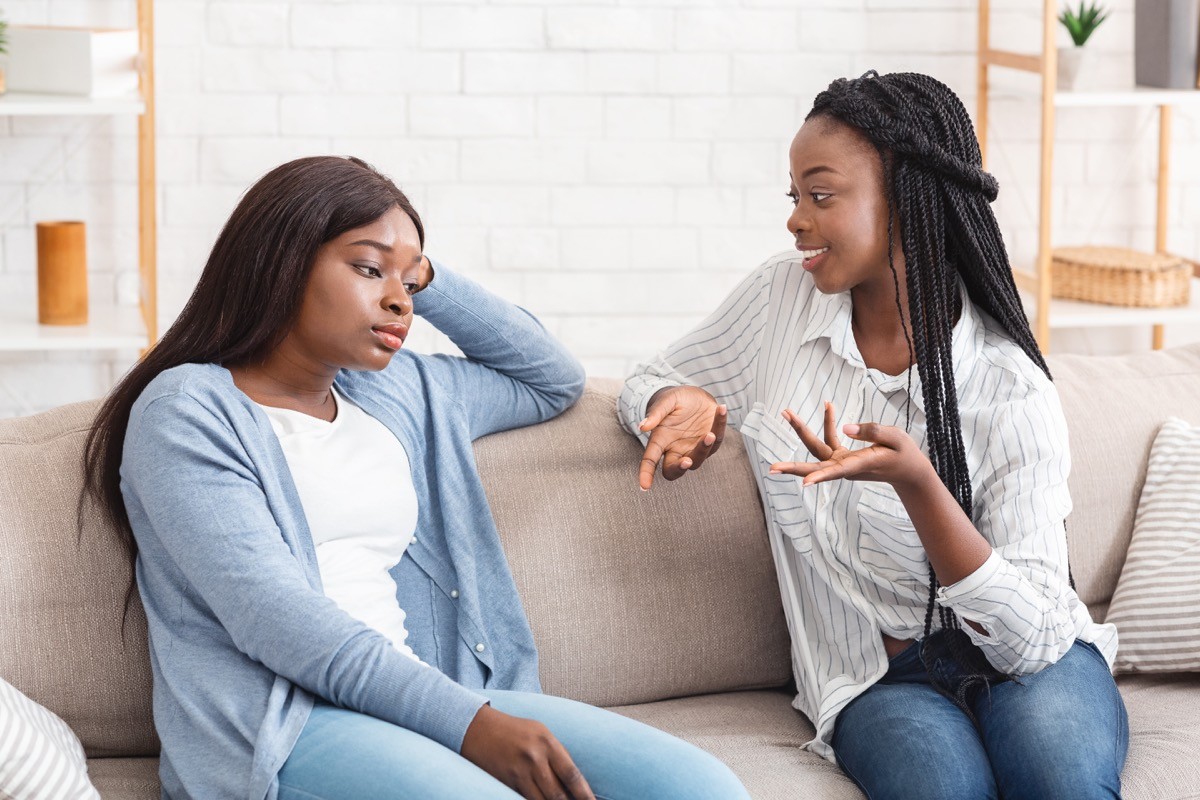17 Signs You’re a Bad Listener, According to Experts

According to a 2023 study published in The International Journal of Listening, strong listening skills are essential for building trust, strengthening relationships, and even excelling at work. But, we’re living in a a time when everyone is constantly distracted. From non-stop notifications to packed schedules and trying to multitask, actually paying attention to someone can be tough.
Research shows that the average person only remembers about 25% of what they hear in a conversation. That means most of us are missing key details, failing to connect, and possibly frustrating the people in our lives—without even realizing it.
So, how can you tell if you’ve developed bad listening habits? We asked communication experts to break down the most common signs that you’re not as attentive as you should be. From subtle behaviors to glaring red flags, here are 17 telltale signs you might be a bad listener—and what to do about it.
RELATED: 101 Flirty Texts That Will Drive Anyone Wild
1
You interrupt people.

Interrupting others is obviously not a great practice, but you may not realize that some of the ways you’re trying to show interest during a conversation are just as bad.
“Some of us may have good intentions thinking we know what the other person is about to say, and in an effort to bring them to the finish line, we complete the sentence for them,” explain James and Suzann Pawelski, psychologists and co-authors of Happy Together: Using the Science of Positive Psychology to Build Love That Lasts.
“Even if we’re accurate, interrupting is almost always perceived by others as very rude and intrusive. At the end of the day, we’re not mind readers. We should let the other person finish and give them the respect and time needed to finish stating their ideas.”
RELATED: 8 “Polite” Questions That Are Actually Rude
2
You turn the conversation back to yourself.

Your friend tells you about their recent vacation to Italy, so you bring up your trip there five years ago. Or, maybe your colleague talks about having to move, and you tell them about how you had to move last year. At a certain point, your behavior stops being a matter of commiserating or sympathizing and shifts into self-absorption.
“This is a negative behavior that can easily cause problems in professional and personal relationships because it comes across as selfish,” the Pawelskis say. “When we immediately turn the focus of the conversation to ourselves, we are indirectly telling the other person that we don’t care about what they’re saying.”
3
You don’t ask questions.

A conversation is an exchange of thoughts and information, and it should really go in two directions. Good listeners ask the other person informed questions to have a healthy back and forth. Bad listeners do not.
“Conversations die an awkward death when questions are not asked,” says dating expert Celia Schweyer of DatingRelationshipsAdvice.com. “Apart from the conversation dying out, your lack of questions means you didn’t care enough to follow the conversation. It can even signal you don’t care about the person talking.”
RELATED: I’m a Dating Coach and These Are the 3 Questions You Should Ask on a First Date
4
You nod excessively.

Nodding along as someone tells you something is often perceived as a positive type of body language, helping to show that you are listening carefully. But, if it seems like you’re just going through the motions, people will definitely pick up on that.
“Nodding too much just indicates that you’re not listening and just humoring the speaker, only pretending to be interested in the conversation,” adds Schweyer.
By practicing active listening, you’ll nod much more naturally.
5
You get defensive.

It’s common to react defensively if you feel you’re not being heard or are facing a lot of questions. But, that reaction could be bubbling up because you aren’t actually listening to the other person.
“If you don’t agree with what the other person is saying, pause, ask questions, try to be positive [and] respectful, and seek to understand their viewpoint,” suggest the Pawelskis. “Then, in a calm and thoughtful manner, you can bring up any concerns after you’ve listened to them and really tried to understand their viewpoint.”
In the same way, they should show the same respect for you when you have the floor.
6
You hurry the speaker along.

You’re busy, but that’s no excuse for nudging the person you are speaking with along so that they get to their point quicker.
“Glancing at your watch or surveying your surroundings while talking with someone are indicators that you’d rather be somewhere else,” says Schweyer. “If you do this, you’re sending the message that you’re not interested in the conversation anymore, and you’ve run out of patience talking to them.”
RELATED: The Most Polite Zodiac Sign, According to Astrologers
7
You show unwelcoming body language.

Body language is an essential part of communication. Ticks and fidgeting not only convey to others that you’re nervous or uncomfortable, they also reveal you aren’t fully engaged in the conversation.
As body language expert Carol Kinsey Gorman told Forbes, body language that matches what’s being said builds trust. If those two don’t match, that can signal internal conflict or aversion to the topic at hand.
8
You avoid eye contact.

One of the major forms of body language that sets good listeners apart is eye contact.
“When we avoid looking at our conversational partners, we tend to miss the non-verbal cues—facial expression, body posture, gesticulation—that create an emotional context for what people are communicating,” says Kristin Bianchi, a licensed psychologist who specializes in treating anxiety disorders.
While avoiding eye contact can sometimes be rooted in anxiety or disorders that may require more involved treatments, in many cases, it’s just due to the fact that your attention is wandering. “Quite often, our eye contact is undermined by talking while we’re splitting our attention between our conversation partner and a distracting object in our immediate environment such as smartphones, laptops, or a TV,” says Bianchi.
Make a better effort to look people in the eye when you’re talking to them, and your listening habits will improve.
9
You often hear: “I already told you that, remember?”

This is a quite obvious sign that you’re a bad listener, but it comes with some exceptions.
“While conditions like anxiety, depression, grief, ADHD, brain injuries, and dementia can interfere—with varying degrees of severity—with our memory, if we’re not impaired by those challenges, we might be mistaking ‘forgetting’ for ‘careless listening,'” explains Bianchi.
“The less attuned we are to a conversation, the less likely our brains will encode it in long-term memory, and we can’t remember what we never really ‘heard’ in the first place.” So, from now on, make it a point to pay attention more to what people are telling you.
RELATED: 5 Best Memory-Boosting Foods, According to Doctors
10
You can’t wait for your turn to speak.

Theres a big difference between being enthusiastic about something and anxiously tapping your foot as you wait for someone to stop talking… so you can start.
“You’re so eager to speak you’re not hearing some of what’s being said,” says Halelly Azulay, a leadership development strategist and founder and CEO of TalentGrow LLC. “You might learn something, or change your mind, or maybe even agree if you just took the time to listen to the whole message the speaker is communicating before barging in or interrupting them.”
11
You don’t say anything. At all.

Even if someone’s a big talker, it’s usually not a good look for you to be passive. “Silence speaks volumes,” says Sonya Schwartz, relationship expert at Her Norm.
“Isn’t it terrible to try connecting with someone who’s just not there? Communication is always the key. Give advice, be empathetic, support using your words, hold their hand—this would change the dynamics and can make their day.”
Of course, there’s a caveat here: If the power feels off in the conversation, like the person is talking down to you or it’s getting combative, silence can be acceptable to diffuse a tense situation momentarily. But, a more level-headed talk should soon follow.
12
You’re only focused on your response.

If you’re too worried about what you’re going to say in response to someone, chances are high you’re missing out on a pivotal part of the dialogue that’s happening.
“When someone speaks, they are describing what they think, know, need, or feel to the listener,” says Azulay. “The listener needs to be listening to their message in order to receive it and process its meaning. If your brain is busy thinking of a response, you’re not listening—period.”
13
You try to one-up people with your own stories.

It might seem like you are so actively engaged in a convo that you’re quick to commiserate or relate, but this is a form of steamrolling over people. Good listeners give others a chance to shine without needing to share their own experiences.
“While you’re hoping that person will fully appreciate the story you’re about to tell, you’re not giving them that same respect,” says KC McCormick Çiftçi, founder of relationship advice website Borderless Stories. “If the other person is inclined to do the same thing, this can turn into a vicious circle of barely related stories as you try to one-up each other [instead of] actually listening.”
RELATED: The Hardest Zodiac Sign to Date, Astrologers Say
14
You often forget people’s names.

Everyone’s been in this situation, but if you frequently find yourself forgetting people’s names, it may be a sign of a lack of focus.
“By accepting that we’re simply ‘bad at names,’ we give ourselves permission to not even try,” says Çiftçi. “If this is someone whose name matters—and they all do—then why not try one of the many tricks we’ve surely already heard for remembering names?”
For instance, repeating their name back to them, using a mnemonic device, or an association game can all help.
15
You’re clearly thinking about something else.

When you’re talking with someone, it’s not the time to go over all the other things you need to get done that day.
“If your brain is busy making a list and checking it twice, there’s no way it’s also listening,” says Azulay. Recenter your focus on the person across from you.
RELATED: 156 Ways to Say “I Love You” (Without Saying It)
16
You avoid topics that don’t interest you.

Painfully boring exchanges happen, but every now and then, they’re necessary to learn something new or change a perspective. So try your best to listen up.
“These might not be the most rewarding of social exchanges, but in order to be socially effective and polite, it’s important to offer reciprocity—no matter the topic,” says Bianchi. “You don’t have to converse for hours on subjects that don’t interest you, but just as you want to feel heard, ypu owe it to others to listen.”
17
You head for the door.

It’s common for bad listeners to have this one thing in common: Heading for the exit in the middle of an exchange.
“This prevents you from having meaningful conversation and rushes the other person,” says Lynell Ross, founder and managing editor of wellness and relationship advice platform, Zivadream. “If you need to leave, just be honest and say so, but listen intently as they are speaking.”
By practicing active listening, narrowing your focus on a speaker, and acknowledging their words with your own actions and body language, you’ll turn your bad listening habits around stat. From here, your relationships will improve, your bonds will feel stronger, and you’ll hear others say, “You’re such a great listener.”